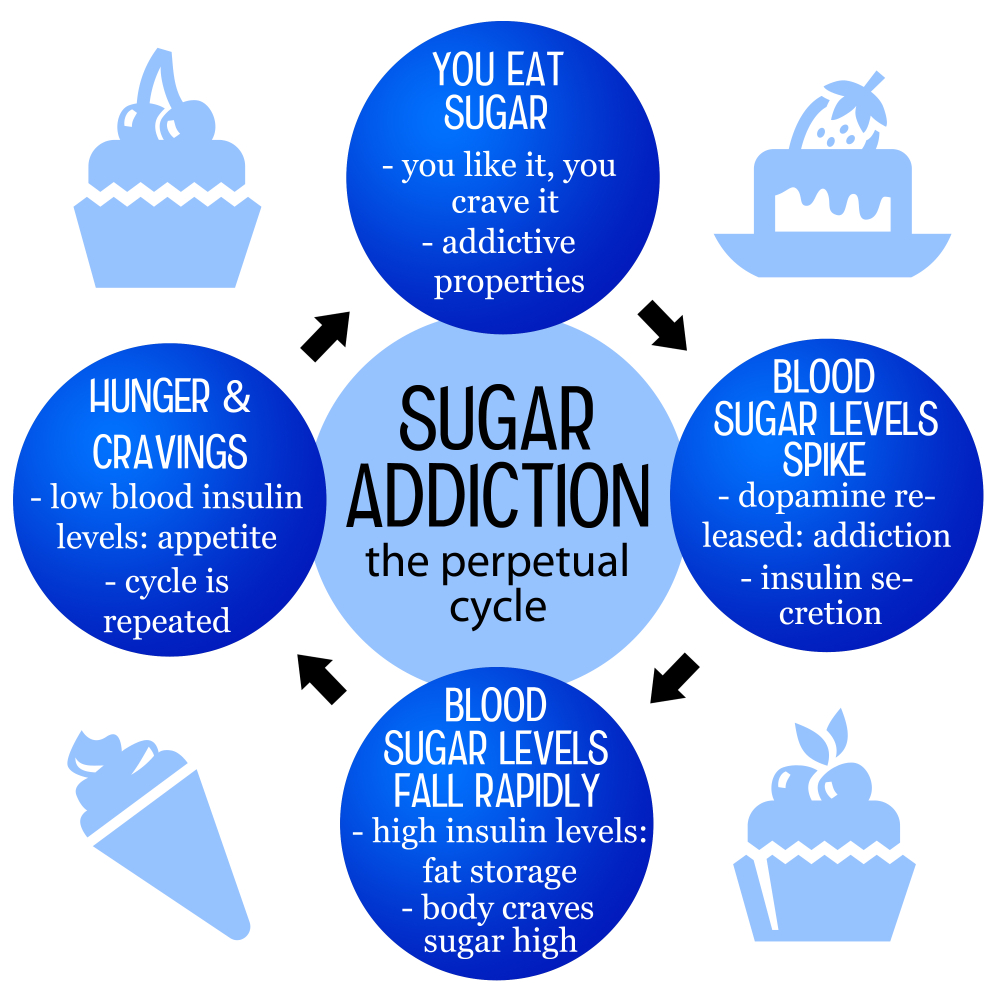Is sugar addictive? This question sparks a fervent debate among nutrition experts and the general public alike. Many people experience intense sugar cravings, often linked to the consumption of processed foods laden with high levels of dietary sugar. While research indicates that sugar can trigger compulsive eating behaviors, its classification as an addictive substance remains contentious. Understanding the effects of sugar on our bodies and minds is crucial, especially as we navigate a food landscape dominated by ultra-processed snacks and beverages. As we delve into this topic, it’s important to explore how sugar addiction may resemble, yet differ from, dependencies on substances like alcohol and nicotine.
The addictive properties of sweeteners are a hot topic in discussions surrounding dietary habits and cravings. Often compared to substances like nicotine, these sugar-laden foods can lead to compulsive consumption, drawing parallels to other addictive behaviors. As more individuals seek to understand their relationship with this influential ingredient, terms such as “saccharine dependency” and “sweet cravings” are becoming more prominent. This exploration of sugar’s psychological and physiological impacts highlights the complexities of our dietary choices and how refined sugar affects our overall health. By examining these alternative ideas, we can better identify the nuanced effects of incorporating sugar into our diets.
Understanding Sugar Cravings and Their Origins
Sugar cravings can be intense and overwhelming, often leading people to consume more sugary snacks and beverages than they plan. These cravings are often linked to the body’s need for quick energy boosts, as sugar is a fast-acting carbohydrate that can provide immediate fuel. Furthermore, the palatability of sugary foods makes them highly desirable, especially in a world where processed foods are everywhere. When we consume these foods regularly, they can condition our brains to seek them out continuously, leading to habitual consumption.
Another factor that contributes to sugar cravings is the impact of stress on our eating habits. When we experience stress or emotional distress, many turn to comfort foods loaded with sugar as a way to alleviate these feelings, creating an unhealthy cycle of emotional eating. By understanding the triggers of sugar cravings, individuals can develop better coping mechanisms and limit their reliance on sugary snacks, which can ultimately improve their dietary habits and overall health.
Frequently Asked Questions
Is sugar addictive in the same way as alcohol or nicotine?
While sugar does not meet the clinical criteria for addiction like alcohol and nicotine, it can create cravings and compulsive eating behaviors. The ultra-processed foods high in dietary sugar maximize these cravings, leading to habitual consumption and withdrawal-like symptoms when reduced.
What are the effects of sugar addiction on the body?
Sugar addiction can lead to various physical and psychological effects, including increased cravings for sweets, headaches, anxiety, and even dizziness when you try to cut it out. Although sugar isn’t classified as an addictive substance, its consumption can trigger behaviors similar to those seen with addiction.
How do sugar cravings relate to processed foods?
Sugar cravings are often linked to processed foods, which contain added sugar, unhealthy fats, and sodium. These foods are designed to be highly palatable, making it easy to develop a dependence on them and experience strong cravings for sugary items.
What is the role of sugar in our diet?
Sugar does play a role in our diet, as it is found naturally in many healthy foods like fruits and dairy. While excessive added sugar can lead to health issues, consuming low to moderate amounts can enhance flavor and enjoyment. Balance and moderation are key.
How can I manage sugar addiction effectively?
To effectively manage sugar addiction, consider reducing the amount of added sugar gradually instead of going cold turkey. Start by reading food labels and being aware of your sugar intake, aiming to stay within recommended limits set by health organizations.
What is the recommended limit for added sugar intake?
The American Heart Association recommends that men limit added sugar intake to no more than 9 teaspoons per day, women to 6 teaspoons, and children to much less. Being mindful of these guidelines can help mitigate the adverse effects of sugar addiction.
Why is it important to distinguish between sugar and addictive substances?
Distinguishing sugar from addictive substances is important because while sugar can lead to cravings, it is also an essential part of a balanced diet found in natural foods. Unlike drugs or alcohol, sugar cannot be completely eliminated, as we need some level of sugar for dietary health.
| Key Point | Details |
|---|---|
| Sugar Addiction Debate | Cravings exist but sugar isn’t classified as an addictive substance like drugs or alcohol. |
| Effects of Sugar | Sugar can enhance cravings and compulsive eating behaviors, leading to physical and psychological effects. |
| Ultra-Processed Foods | Such foods increase cravings due to their palatable nature and are often high in both sugar and unhealthy fats. |
| Withdrawal Symptoms | When stopping sugar suddenly, individuals can experience headaches, anxiety, and other symptoms, though less severe than those for drugs. |
| Dietary Recommendations | The average American consumes about 20 teaspoons of added sugar daily. The AHA recommends 9 teaspoons for men and 6 for women. |
| Moderation is Key | Consuming sugar in low to moderate amounts isn’t harmful; awareness of sugar intake is crucial. |
| Conclusion | Sugar offers pleasure and is necessary for some dietary functions, but needs to be balanced and monitored. |
Summary
Is sugar addictive? While sugar has been shown to create cravings and can lead to compulsive eating, it is not classified as an addictive substance like nicotine or alcohol. It can stimulate our pleasure centers and may lead to withdrawal-like symptoms if eliminated abruptly. Importantly, in moderate amounts, sugar can enhance our diet without significant health risks. Therefore, understanding and moderating sugar intake is crucial for maintaining a healthy lifestyle.
